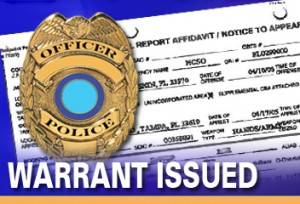 A judge commanding law enforcement officials to bring a wanted person before the court to answer to criminal charges issues an arrest warrant.
A judge commanding law enforcement officials to bring a wanted person before the court to answer to criminal charges issues an arrest warrant.
The Fourth Amendment[1] to the US Constitution commands that the following conditions exist for an arrest warrant to issue:
“The right of the people to be secure in their persons … against unreasonable searches and seizures, shall not be violated, and no Warrants shall issue, but upon probable cause, supported by Oath or affirmation, and particularly describing the … the person … to be seized.”
The Arrest Warrant Process
A criminal complaint, information or grand jury indictment, filed in court initiates the warrant process. These are charging documents that allege the commission of a crime.
Along with the charging documents is an affidavit of probable cause. Either a police officer or a prosecutor before a judge with jurisdiction swears to the affidavit. The affidavit describes some of the evidence against the individual named in the complaint.
If the judge believes there was a crime and the named individual was involved, the warrant will issue. The judge also reviews the individual’s identifying information including name, date of birth or characteristics such as tattoos, height, weight, etc. This is to lower the possibility of the wrong person being arrested on the warrant.
The warrant will also usually include conditions for release on bond to be met by the subject of the warrant when arrested. Warrants issued in serious capital crimes[2] and felonies may issue without conditions of release, and the arrestee remains in custody for a hearing on release issues before the issuing judge.
Bench Warrants
In some circumstances, a person has appeared in court or been arrested without a warrant and ordered to appear in court. If that individual fails to appear, the judge may issue a bench warrant. A bench warrant can issue for persons in contempt of court if that person failed to appear for a mandated court appearance. This can happen in either criminal or civil court proceedings.
Persons free on bail awaiting criminal trial failing to appear in court run the risk of a bench warrant and of losing the bail posted to secure release from custody. Forfeiture of the bail explains the common name of bond forfeiture warrant. In such instances, the court may require posting of a higher bail amount for release from custody when the subject is re-arrested or deny bail.
Often, the re-arrested subject remains in custody without bail. Having failed to appear in court the defendant will be considered a flight risk.
Geographic Limitations of Arrest Warrants
Warrants may issue for felonies, misdemeanors or for failing to appear on minor matters such as traffic tickets. There is time and expense associated with arresting, jailing, processing and transporting the person subject to arrest. Due to these considerations, the prosecutor requesting a warrant will also request to limit the geography in which the warrant is effective.
In minor cases, the warrant is usually limited to the county interested in the matter. For misdemeanors warrants are typically effective in the issuing county and immediately adjoining counties. For other crimes a warrant can be statewide. If the crime is serious enough and the prosecuting authority is interested in finding the person and willing to bear the expenses of extradition, then the warrant will be in effect nationally, possibly internationally.
If the subject of a limited warrant encounters law enforcement outside the warrant’s geographic limitations, he may not be arrested on the warrant. The requirement for one State to return a person wanted on another State’s warrant is found in Art. IV, sec. 2 of the Constitution.
Information about Arrest Warrants
When a warrant is issued in the United States, it is registered with the National Crime Information Center (NCIC), a division of the FBI. NCIC is a computerized index of criminal justice information (i.e. criminal record history information, fugitives, stolen properties, missing persons). It is available to Federal, state, and local law enforcement and other criminal justice agencies and is operational 24 hours a day, 365 days a year. This resource may be accessed only by law enforcement and relied upon to arrest wanted individuals.
While there are many internet resources to obtain criminal arrest warrant information, county sheriffs in the United States maintain records of active warrants in their jurisdictions. Many sheriffs’ departments have now put these records online and are searchable. Some examples are the Will County, IL and Lee County, FL sheriffs’ departments.
If you believe there is a warrant for yourself or someone you know, the best place to check is with the sheriff in the county where the crime was committed.
[1] The Fourth Amendment is part of the Bill of Rights. Much of the Bill of Rights is related to protections for persons accused of crimes from the power of government.
[2] Capital crimes are those with a possible penalty of life in prison or death.






[…] Though rare, a person who leaves Florida when wanted by law enforcement for a misdemeanor warrant may be subject to […]